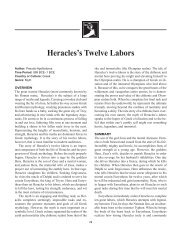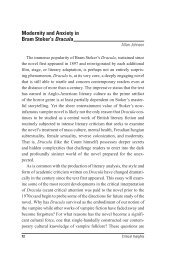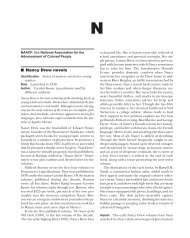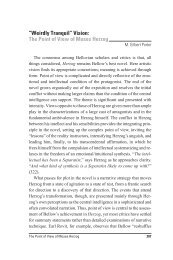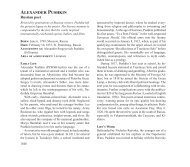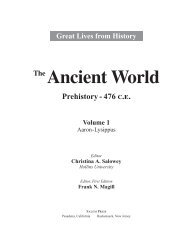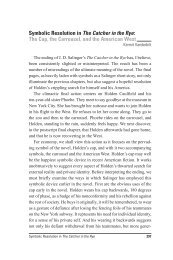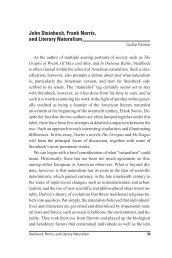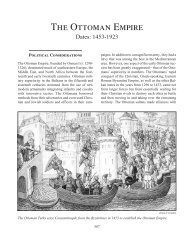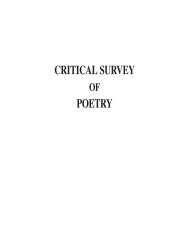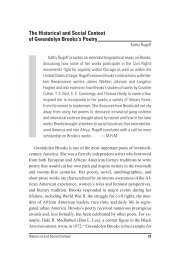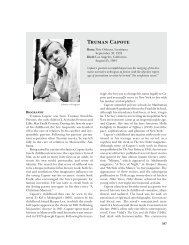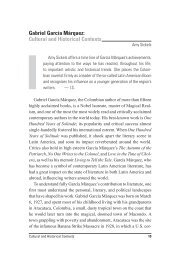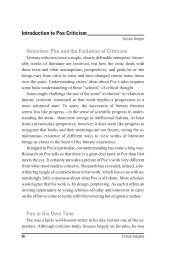“A Fragment of Lost Words”: Narrative Ellipses in The ... - Salem Press
“A Fragment of Lost Words”: Narrative Ellipses in The ... - Salem Press
“A Fragment of Lost Words”: Narrative Ellipses in The ... - Salem Press
You also want an ePaper? Increase the reach of your titles
YUMPU automatically turns print PDFs into web optimized ePapers that Google loves.
fail<strong>in</strong>gly bland and ridiculous Gatsby’s own memoir, were he able to<br />
write one, would be. Nick br<strong>in</strong>gs to Gatsby’s story the right degree <strong>of</strong><br />
<strong>in</strong>volvement and detachment; he has the poet’s ability, as Shelley put it<br />
<strong>in</strong> his “to see life steadily and see it whole.”<br />
Yet <strong>in</strong> order to see Gatsby’s story steadily and whole, Nick must exclude<br />
from his narrative almost everyth<strong>in</strong>g that does not speak <strong>of</strong><br />
Gatsby and his world. He glosses over many <strong>of</strong> the quotidian details<br />
that would have comprised his life and occupied his m<strong>in</strong>d dur<strong>in</strong>g<br />
his time <strong>in</strong> New York City and on Long Island. <strong>The</strong> specifics <strong>of</strong> his<br />
bond-<strong>of</strong>fice job, the girl from Jersey City whom he dates for awhile,<br />
and any number <strong>of</strong> similar <strong>in</strong>cidents are given only m<strong>in</strong>imal attention.<br />
Some novels are omnibus constructions, like the sprawl<strong>in</strong>g multi-plot<br />
Victorian works that Henry James termed “loose and baggy monsters.”<br />
A three-volume Dickens or Thackeray novel can expand to <strong>in</strong>corporate<br />
multiple plot l<strong>in</strong>es, <strong>in</strong>cidents, and moods. Fitzgerald’s novel, however,<br />
functions accord<strong>in</strong>g to a very different aesthetic. <strong>The</strong> Great<br />
Gatsby is a study <strong>in</strong> concentration <strong>of</strong> effect and unity <strong>of</strong> form. Fitzgerald<br />
was well aware <strong>of</strong> the process <strong>of</strong> selection by which he constructed<br />
his novel. Reflect<strong>in</strong>g on his process <strong>of</strong> composition <strong>in</strong> a personal letter,<br />
he wrote, “<strong>in</strong> Gatsby I selected the stuff to fit a given mood <strong>of</strong><br />
‘hauntedness’ or whatever you might call it, reject<strong>in</strong>g <strong>in</strong> advance <strong>in</strong><br />
Gatsby, for <strong>in</strong>stance, all the ord<strong>in</strong>ary material <strong>of</strong> Long Island” (Fitzgerald<br />
1963, 550–51). See<strong>in</strong>g life whole requires one to focus wholly on<br />
the life one is see<strong>in</strong>g: Gatsby’s, <strong>in</strong> this case. If a particular aspect <strong>of</strong> life<br />
on Long Island did not fit <strong>in</strong>to this vision, Fitzgerald’s narrator would<br />
simply omit it.<br />
Yet Nick’s narrative selectiveness derives not only from his desire to<br />
tell Gatsby’s story, but also from his war<strong>in</strong>ess <strong>of</strong> tell<strong>in</strong>g his own. At<br />
times, Nick’s guardedness makes him what critic Wayne Booth termed<br />
“an unreliable narrator.” Because he himself is so closely <strong>in</strong>volved<br />
with the story he tells, Nick has an <strong>in</strong>terest <strong>in</strong> leav<strong>in</strong>g gaps between his<br />
narrative discourse and the “real” story. This is particularly true when<br />
the topic turns to his own biography. Early <strong>in</strong> the novel, his cous<strong>in</strong><br />
<strong>“A</strong> <strong>Fragment</strong> <strong>of</strong> <strong>Lost</strong> <strong>Words”</strong> 193



